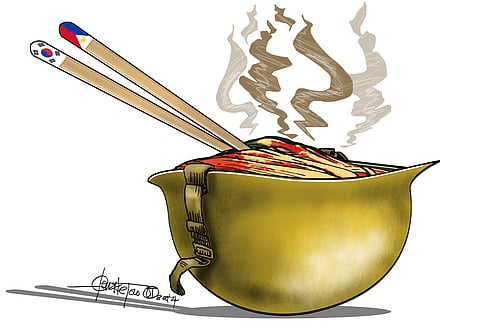
- NEWS
- the EDIT
- COMMENTARY
- BUSINESS
- LIFE
- SHOW
- ACTION
- GLOBAL GOALS
- SNAPS
- DYARYO TIRADA
- MORE

There is a much deeper connection between the Philippines and South Korea than the current craze for K-Pop and Korean dramas among young Filipinos. The Korean War, in which the Philippines played a pivotal role in the United Nations’ fight against North Korean aggression, was the furnace in which this partnership was forged in the 1950s.
At the time, about 7,420 Filipino soldiers served in the Philippine Expeditionary Force to Korea (PEFTOK) under the UN Command, an involvement that was remarkable for its size and zeal to protect democracy from the communist scourge that was on overdrive.
Important fights in which the PEFTOK took part included those at Waegwan, Gimcheon, Daegu, Cheolwon and the Imjin River. In the Battle of Miudong, Filipino soldiers displayed extraordinary bravery by valiantly defending a strategically significant hill from the onslaught of enemy forces.
During the Battle of Yultong, they again demonstrated their bravery by stopping the North Korean advance and aiding the overall effort to stabilize South Korea. Their tenacity in the face of intense enemy fire was also on full display at the Battle of Hill Eerie.
The Filipinos’ participation was not without consequence, as a total of 112 PEFTOK soldiers were killed, 299 were wounded, and 57 were reported missing in action. The Philippines felt the impact of every loss, which highlighted the importance of sacrifices made in the name of a common goal.
Both the Philippines’ worldwide reputation and its ties, especially with the United States, were bolstered by the sacrifices of the Filipino soldiers. As symbols of courage and dedication to a higher cause, the PEFTOK warriors are venerated as heroes in the Philippines.
The solid diplomatic ties we see today is the result, in part, of this experience that set the standard for future collaborations. The longstanding military cooperation set the stage for a more comprehensive alliance, which now has to adapt to the changing global circumstances.
As things stand, the diplomatic relations between South Korea and the Philippines have significant geopolitical ramifications, especially as both countries deal with the intricacies of regional security, especially regarding China’s aggressive behavior in the South China Sea.
Considering Beijing’s overreach in the South China Sea, which overlaps the West Philippine Sea, the meeting on Monday in Manila between South Korean President Yoon Suk Yeol and Philippine President Ferdinand Marcos Jr. represented a turning point in their bilateral ties. There will be no hollow formalities here; rather, the two countries are committing to working together in the face of external dangers.
Maritime cooperation was highlighted as a key issue in resolving the continuing concerns in the South China Sea during the discussion between the two leaders. In reiterating the importance of a rules-based maritime system, President Yoon expressed a common desire for regional stability, security, and peace.
Yoon made it clear that both nations will keep cooperating to create a maritime order based on norms and to protect the freedom of navigation and overflight in accordance with international law.
Like the Philippines, South Korea has voiced “grave concern” over China’s provocative behavior in the South China Sea and has called for a unified response. By deepening their connection, both countries are sending a message to China to respect the rule of law.
A 2016 arbitral ruling shot down as baseless China’s claim to nearly the entire South China Sea, while affirming the validity of the Philippines’ 200-nautical mile exclusive economic zone in the WPS.
“We must work together to achieve prosperity for our peoples and to promote a rules-based order,” President Marcos rightly said, “as the geopolitical environment is only becoming more complex.” This statement demonstrates how seriously both countries take their alliance, which is vital to the security of their nations and the surrounding area.
The Philippines and South Korea have shown that their bond, formed during a war, can now stand as a shield against global instability by reiterating their dedication to working together. This puts them in a strong position to face these challenges head-on. In the face of ever-changing dangers, their partnership represents more than just a common past; it also represents a shared goal of a safe and successful future.
